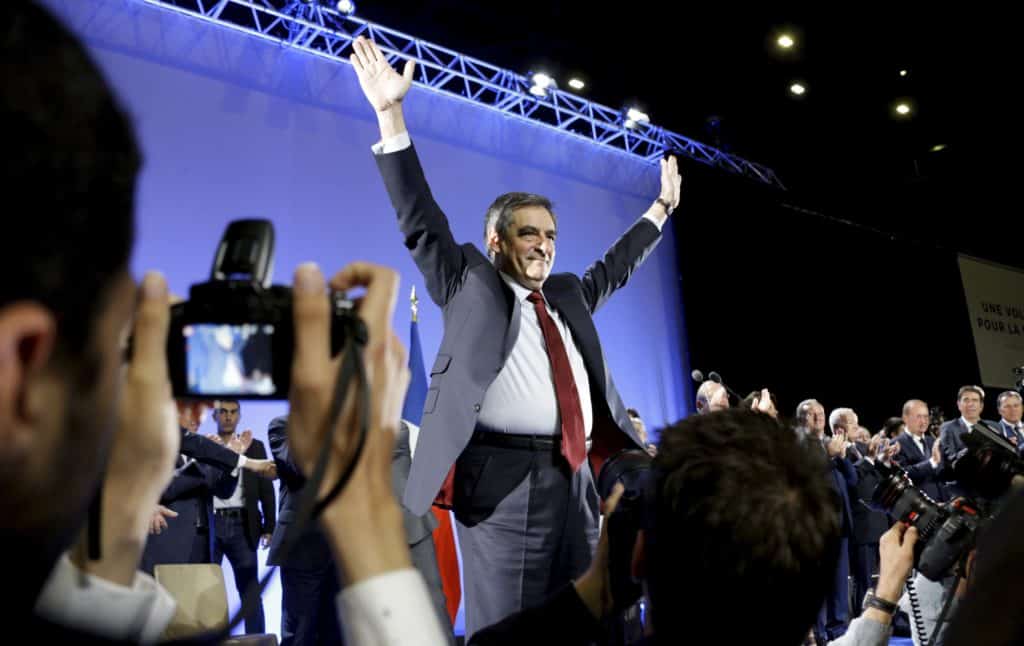François Fillon Moves Back Into Contention in French Presidential Race
Jon Henley, The Guardian, April 20, 2017

Francois Fillon (Credit Image: © Maxppp via ZUMA Press)
Against all expectations except perhaps his own, François Fillon, the scandal-hit rightwing candidate for the French presidency, is back in the race.
Setting aside an earlier focus on economic shock therapy, Fillon appeared alongside his former rival Alain Juppé on Wednesday in an awkward show of centre-right unity, four days before the first round of voting in an election now too tight to call.
On Tuesday night he wooed voters tempted by the far right with patriotic rhetoric. Addressing a cheering crowd in Lille, he conceded his campaign “hasn’t been a walk in the park”, but said: “I’ve a feeling we’re going to rewrite the scripts the others have devised for us … We’ll make history.”
For three months, from November to January, Fillon – a free-market liberal and social conservative in a country where that mix is almost unknown – was the firm favourite to be the next occupant of the Elysée palace.
To the surprise of many, the former prime minister had comfortably seen off his one-time boss, the former president Nicolas Sarkozy, and the more moderate Juppé to win the nomination of the centre-right Les Républicains party.
The Thatcherite-style reforms Fillon promised for what he called a “bankrupt” France – cutting taxes and public spending, slashing public sector jobs, raising the retirement age and liberalising labour laws – were tough but necessary, his supporters felt.
His sober manner and polished image as the responsible, clean-hands candidate put him up with the far-right leader Marine Le Pen at the top of the first-round polls, and he was forecast to defeat her handsomely in the run-off.
But then the satirical and investigative newspaper Le Canard Enchaîné revealed he had paid his British-born wife Penelope hundreds of thousands of euros of public money for parliamentary assistance she allegedly did not provide.
A stream of further allegations followed: that Fillon had set up similar, short-term work for his children; got a billionaire friend to pay Penelope for a non-job on his literary magazine; accepted gifts of bespoke suits and watches worth tens of thousands.
Reports surfaced that a consultancy set up by Fillon in 2012 had since earned more than €1m from sometimes decidedly dubious sources, and there were claims that a Lebanese billionaire had paid Fillon paid $50,000 for an introduction to Vladimir Putin.
Both Fillon, 63, and his wife were placed under formal investigation for abuse of public funds last month. He has blamed a plot by leftwing political rivals including the outgoing Socialist president, François Hollande, magistrates and the media.
He has consistently denied any wrongdoing, but has admitted having made some mistakes. “I’m not asking you to love me,” he all but implored at one recent Paris rally. “I’m just asking you to support me, because it is in France’s interests.”
His fall, however, was brutal. At the height of Penelopegate, as the scandal inevitably became known, Fillon shed 10 points in the polls, slipping far behind Le Pen and the fast-rising independent centrist Emmanuel Macron. Last week, the hard-left candidate Jean-Luc Mélenchon surged into third place in some polls.
But with the first round now fast approaching and the two frontrunners appearing to run out of steam, Fillon’s support has firmed. Perhaps suffering from scandal fatigue, some rightwing voters earlier tempted by Macron to the centre and Le Pen further to the right may be returning to the fold.
Recent polling shows the two frontrunners on 23-34% of the vote, leading Fillon and by barely three points and with Mélenchon a point or two behind. But with as many as one-third of voters still undecided, any two of the leading four could go through to the 7 May runoff.
In part, Fillon can thank the unswerving loyalty of his core base – the socially conservative religious right. A practising Catholic, Fillon has long promoted traditional “family values” as a foundation for French society.
Born in the traditionally Catholic Sarthe department west of Paris, Fillon is the son of a history professor mother and solicitor father. With Penelope, whom he met in Le Mans when she was a student on a year abroad, he has raised five children in a 12th-century chateau.
He has abstained or voted against laws on equality between men and women and same-sex marriage and is personally opposed to abortion, though he would not try to repeal the 1975 law that legalised it in France.
A year after he was first elected as France’s youngest MP, he opposed the 1982 law that effectively legalised homosexuality. A centre-right gay rights group, GayLib, has described his vision of French society as “clearly hostile to LGBT people”.
Fillon has pledged to defend France’s “Christian values”. He would ban medically assisted procreation and use of sperm donors for single women and same-sex couples, and reverse some gay adoption rights.
He has also promised to set annual quotas on immigration, restrict foreigners’ rights to French nationality, set the age of criminal responsibility at 16, build 16,000 new prison cells and, in foreign policy, develop more positive ties with Russia.
The closing days of the campaign have seen Fillon more openly courting a hard-right vote, evoking France’s sovereignty and identity and promising at his Lille rally to crack down hard on immigration and pursue a zero-tolerance policy on radical Islam.
His ties to the Christian right – Sens Commun, an ultra-conservative family values group, backs his campaign and he hinted recently he might give cabinet jobs to some of its leaders – could yet cost Fillon crucial moderate votes, and for many on the left, his policies and beliefs are clearly anathema.
But polls suggest a place in the second round that appeared to have been thrown away could once more be within his grasp.















